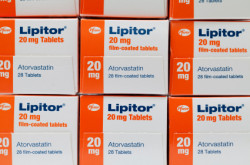Top Class Actions’s website and social media posts use affiliate links. If you make a purchase using such links, we may receive a commission, but it will not result in any additional charges to you. Please review our Affiliate Link Disclosure for more information.

The number of Lipitor lawsuits is growing as women across the country are developing type-2 diabetes as an alleged result of taking Lipitor.
Plaintiff Rosemary Reynolds and her husband filed a short form complaint as part of a larger MDL (multidistrict litigation) on Sept. 17. MDLs allow similar cases, such as the Lipitor MDL, to be combined to simplify the legal process. Reynolds began taking Lipitor in 2002 and stopped in 2012, according to her Lipitor diabetes lawsuit. She was diagnosed with type-2 diabetes in 2009.
Reynolds claims that her diagnosis is directly related to her Lipitor use. The Lipitor diabetes lawsuit accuses Pfizer for failing to warn consumers of the possible type-2 diabetes side effect risk.
Lipitor Diabetes
Millions of middle-aged women have used Lipitor to lower their cholesterol and their chances of heart attack and stroke. However, studies have begun to show that Lipitor users were developing type-2 diabetes. It is estimated that more than 100,000 Americans could be at risk for diabetes caused by Lipitor and other drugs like it. An Archives of Internal Medicine study claims that middle-age women who take Lipitor (and other drugs like it) are nearly 50 percent more likely to develop type-2 diabetes.
After the Internal Medicine study, the U.S. Food and Drug Administration (FDA) forced Pfizer to add the warning of Lipitor diabetes to its labels. Since then, many Lipitor diabetes lawsuits have been filed. A Lipitor diabetes class action lawsuit investigation is underway, and plaintiffs like Reynolds are joining the Lipitor MDL.
Some signs of Lipitor diabetes are increased thirst and hunger, frequent urination, fatigue, headaches, and blurred vision.
Reynolds is one of many who are attempting to make Pfizer take responsibility for allegedly causing type-2 diabetes as a result of taking Lipitor.
The Lipitor Diabetes Lawsuit is Rosemary Reynolds and Norman Drew Reynolds v. Pfizer Inc., et al., Case No. 2:14-cv-03678-RMG, in the U.S. District Court for the District of South Carolina, Charleston Division.
In general, Lipitor lawsuits are filed individually by each plaintiff and are not class actions.
Do YOU have a legal claim? Fill out the form on this page now for a free, immediate, and confidential case evaluation. The attorneys who work with Top Class Actions will contact you if you qualify to let you know if an individual lawsuit or class action lawsuit is best for you. Hurry — statutes of limitations may apply.
ATTORNEY ADVERTISING
Top Class Actions is a Proud Member of the American Bar Association
LEGAL INFORMATION IS NOT LEGAL ADVICE
Top Class Actions Legal Statement
©2008 – 2024 Top Class Actions® LLC
Various Trademarks held by their respective owners
This website is not intended for viewing or usage by European Union citizens.
Get Help – It’s Free
Join a Free Lipitor Class Action Lawsuit Investigation
If you’re a woman who was diagnosed with type-2 diabetes while taking Lipitor, or were diagnosed with diabetes within 90 days or less of your last dose of Lipitor, you may be eligible for compensation. See if you qualify by filling out the short form below.
An attorney will contact you if you qualify to discuss the details of your potential case at no charge to you.
Oops! We could not locate your form.












